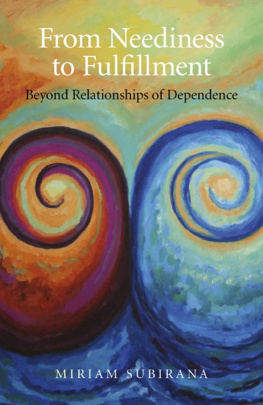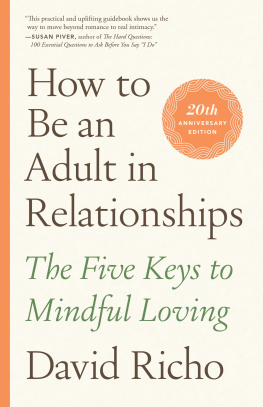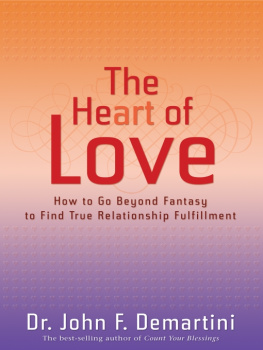First published by O-Books, 2013
O-Books is an imprint of John Hunt Publishing Ltd., Laurel House, Station Approach, Alresford, Hants, SO24 9JH, UK
www.johnhuntpublishing.com
For distributor details and how to order please visit the Ordering section on our website.
Text copyright: Miriam Subirana 2012
Original Title: Cmplices, ms all de las relaciones de Dependencia.
Translated by: Caroline Wilson
ISBN: 978 1 78099 129 0
All rights reserved. Except for brief quotations in critical articles or reviews, no part of this book may be reproduced in any manner without prior written permission from the publishers.
The rights of Miriam Subirana as author have been asserted in accordance with the Copyright, Designs and Patents Act 1988.
A CIP catalogue record for this book is available from the British Library.
Design: Stuart Davies
Cover image: Painting by Miriam Subirana.
Printed and bound by CPI Group (UK) Ltd, Croydon, CR0 4YY
We operate a distinctive and ethical publishing philosophy in all areas of our business, from our global network of authors to production and worldwide distribution.
CONTENTS
I dedicate this book:
To my parents, Juan Antonio and Mercedes, and to my brother Brian.
To Javier Melloni.
To Ima Sanchis, Joan Quintana, Liliana Maffiotte, Joan A. Mel, Marita Oss, Francesc Torralba, Eva Juan, Miquel Vidal, Pilar Jeric, Gaspar Hernndez, Esther Trujillo, Josep Gajo, Xavier Guix, Bernardo Garca, Luis de Anta, Salvador Garca.
With them I have explored questions and new approaches for a life in freedom. My gratitude goes beyond what words can express. They have offered me their friendship with the possibility of seeing beyond established horizons.
To those who have shared their experiences with me. They have enabled me to enrich the reflections that I embark on here.
To the brothers and sisters of the Brahma Kumaris, with whom I have learned the value of an honest heart. Many of the experiences that I write of here are the fruit of my shared living with them and of having listened to so many women and men as they trusted me with their doubts, their fears and their dissatisfactions, their achievements and their yearnings.
To That One who is invisible to the eyes. He is in my Heart; He accompanies me with His unconditional love and caresses my soul in my dark nights and my days of light.
Prologue
In 1951 an inventory was made of the qualities that someone in management should have in order to be considered excellent. Several were highlighted, such as tidiness, a well-presented appearance, or punctuality, although the most interesting one was the last, which said thus: Having a pleasant wife if he wants to be promoted. Evidently, the possibility that the person aspiring to the post might be a woman was not contemplated They were other times, of that there is no doubt. We can say that the twentieth century meant great advances in many areas in the West and one of the most important was that of women being incorporated into the spheres of social and economic power. In the past, around 4000 BC, the figures representing the Goddesses were of the same size as those of the gods, leading to the anthropologists deduction that women played a leading and equal role in primitive societies. However, the climate change or desertification of the Saharaas Steve Taylor, professor of Cambridge, calls itgave rise to, amongst other factors, a radical transformation of society. At a time of great shortage of resources, the need to compete for territory brought about power structures based on strength; this caused the apparition of patriarchy and, consequently, the relegation of women to roles that were dependent on those of the men. But all of this is changing. Today, the incorporation of women in positions of authority implies a deep transformation that is obliging us to look for new balances in couple and family relationships. The paradigms that our ancestors worked with are now obsolete, and to substitute them for new ones requires time and effort, on the part of both men and women, as can be deduced from the results of scientific studies.
Two years ago, The Washington Post published the conclusions of the analysis made by Babcock and Bowles, of Harvard University, according to which the evaluations received by the most assertive women are worse than those who have a more passive role in a process of salary negotiation. They analyzed the opinion of men and women who had watched the recording of over one hundred negotiation processes with people of both sexes. Both women and men praised those males who showed more aggressive negotiation skills, arguing that they were clear about what they wanted, and they penalized the women who played the same role because they had been less nice and who, therefore, they would not give the job to. The conclusions are scary. Beyond the lack of work opportunities, it seems that a social prejudice or a paradigm exists in relation to women who are clear about what they want. That is why, if we want to change a situation that is so deeply rooted in our culture, probably we ourselves as women should begin to liberate ourselves from these toxic clichs, both in what we think and what we say when a woman attains a post of responsibility or, in the emotional terrain, when we want to live out a couple relationship as if it were a search for the handsome prince. We can blame history, culture or others, but I suspect that the work has to begin in each one of us, as Miriam invites us to explore.
This book is an invitation to learn to love ourselves and to love the other without engaging in toxic dependences, and without paradigms that choke us. It is an invitation to experience true love, that love which makes us free and that, as she states, arises out of the encounter of two wholes and not of the belief in and search for the joining of two halves. Miriam knows that we cannot love if we do not feel realized as people; that is why she devotes her first chapters to smashing into tiny pieces the very real chains that imprison us. It is impossible to find realization in our partner if we are waiting for the other to rescue us; if we yearn for perfect, not real, relationships; or if we are so afraid of rejection that we drag dead relationships along with us. That is why this book is a navigation map for all those of us who want to lead a full and authentic life, not only in a partnership, but also in our relationship with ourselves.
A great essaysuch as the one the reader has in his or her handsinvites us to think, to reflect and to be moved to action. To achieve this, Miriam courageously speaks to us out of her own experience, putting herself on the line and committing herself as a person, and what she achieves, through so doing, is that her words leave us far from indifferent. We have all been capable of living through situations of emotional dependence of one kind or another, and we know that, in those spirals, our self-esteem runs a mile. From those spaces we are not able to build solid relationships in which both partners grow in wholeness, because far too often we act out of automatic habit, unresolved needs and a long list of motives that enslave both us and our partner. Miriam shows us that another kind of love is possible, one which is born of wholeness, of the freedom to be oneself and to become a supportive partner on the others path to freedom. Her book offers us clues of great value in the fascinating world of human relationships, navegation routes, studies that corroborate her words and accompany us on that journey which is always difficult but fruitful, the inner journey. It is a marvelous book, highly recommendable, brave, full of wisdom, of intimacy, inciting us to change and question ourselves, written by a woman who is a teacher in what she says, and, even more importantly, in what she does. It is a gift to be able to learn from her, from her friendship, from her way of understanding life and emotional relationships. Thank you for this gift.










